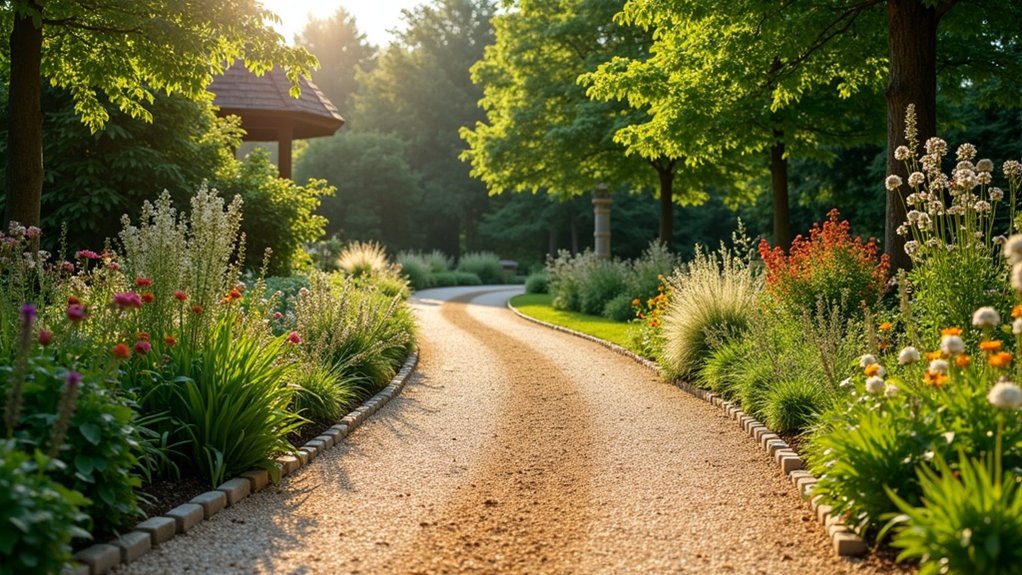Resin-bound gravel driveways offer impressive eco-credentials for UK homeowners. The surface lets 95% of rainfall soak straight through, working brilliantly with our British weather. Made from local stone and recycled materials, these driveways cut down on waste and transport emissions – particularly useful given our environmental targets.
Lasting 15-25 years with minimal upkeep, they’re a sensible long-term investment. Their drainage capabilities help prevent the localised flooding that’s becoming more common across British gardens and streets. The natural look blends well with both modern and traditional homes, whilst supporting local wildlife and plant life.
For anyone weighing up driveway options, resin-bound gravel stands out as a practical, planet-friendly choice that suits our climate and architecture.
Key Takeaways
Eco-Friendly Benefits of a Resin-Bound Gravel Driveway
Superb drainage is the standout feature – these driveways let 95% of rainwater soak through naturally, much like your garden lawn would. This helps prevent local flooding, particularly useful during Britain’s wet winters.
The materials tick all the green boxes. Natural resins combined with recycled aggregate mean less waste heading to our local tips, whilst keeping lorry journeys (and fuel use) to a minimum.
Built to last, these driveways serve 15-25 years – about three times longer than traditional tarmac. That means fewer replacements and less waste over time.
Installation is remarkably efficient, using less energy than conventional concrete laying. Most materials come from nearby quarries, cutting down transport emissions significantly.
These surfaces actually help local wildlife too. By reducing water runoff into streets and sewers, they prevent pollutants from washing into nearby streams and create better conditions for urban plants and animals.
Permeability and Water Management
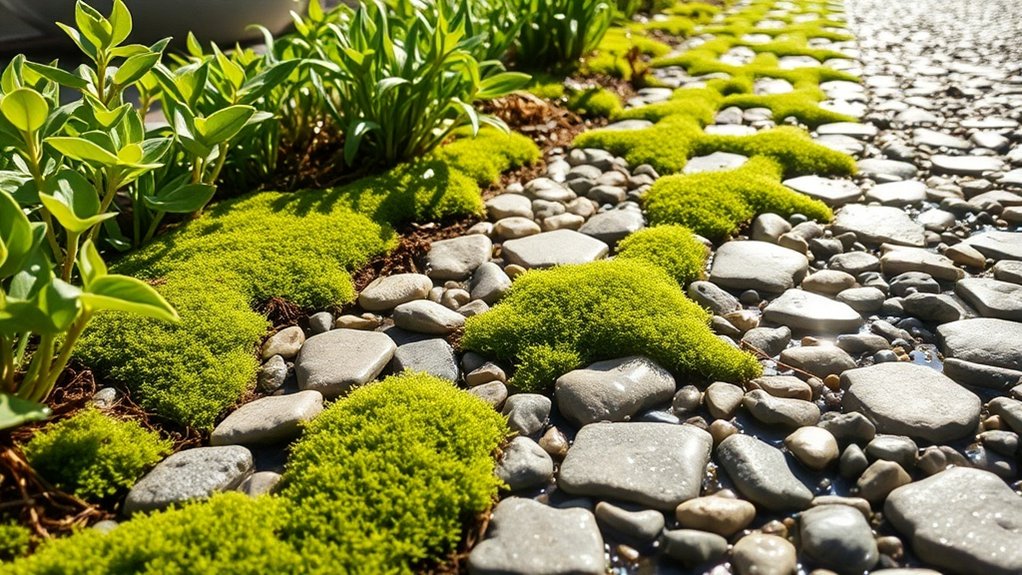
Resin-bound gravel driveways offer excellent drainage benefits that help manage Britain’s notorious wet weather.
These surfaces allow rainwater to filter through naturally, much like a garden would, rather than creating puddles or flooding risks common with concrete or tarmac.
The surface works brilliantly by combining stone and resin to create tiny spaces between particles – imagine a sponge-like effect. Permeability rates can reach up to 95% when installed correctly. When it rains, water seeps straight through to the ground below or flows to designated drainage points. This proves especially useful during heavy downpours, helping reduce localised flooding and easing pressure on our already strained council drainage systems. Resin bound systems are designed to be permeable, which further supports sustainable water management whilst keeping your driveway practical and puddle-free.
It’s particularly valuable in areas prone to flooding or where councils require sustainable drainage solutions for new driveways.
Use of Natural and Recycled Materials
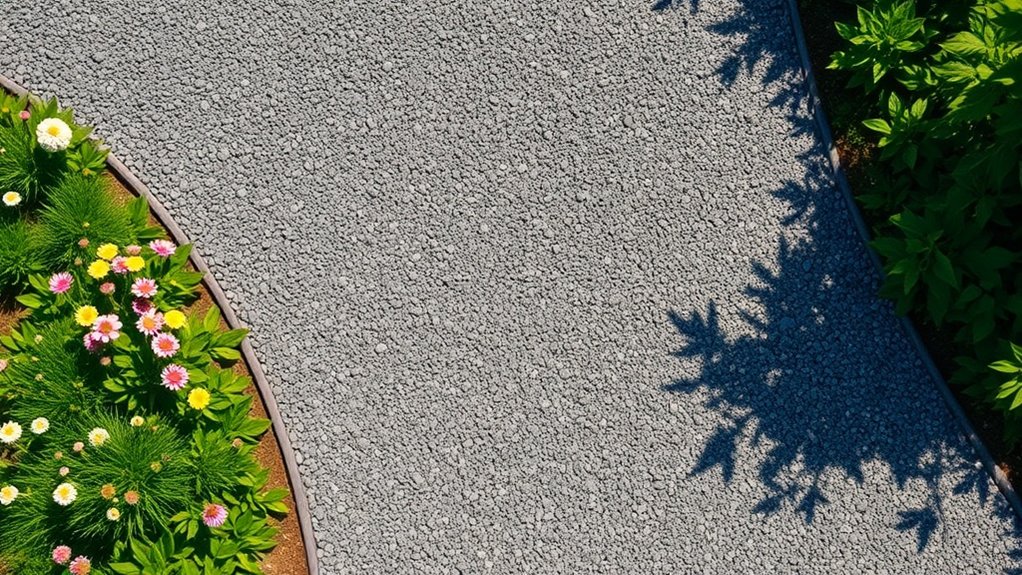
Natural and recycled materials in resin-bound gravel driveways offer a practical, eco-friendly solution for UK homeowners. Natural resins extracted from plants bond effectively with local stone like Cotswold granite or Yorkshire limestone. Adding recycled materials, including crushed glass from local recycling centres or reclaimed aggregates, creates a durable surface whilst reducing landfill waste. This approach delivers both environmental benefits and kerb appeal, with finishes that complement British garden and architectural styles. The combination proves particularly effective in our wet climate, as these surfaces allow proper drainage whilst maintaining their appearance through typical British weather conditions, contributing to eco-friendly outdoor solutions. Furthermore, the use of recycled materials supports local economies and helps minimize the carbon footprint associated with new quarrying.
Longevity and Waste Reduction
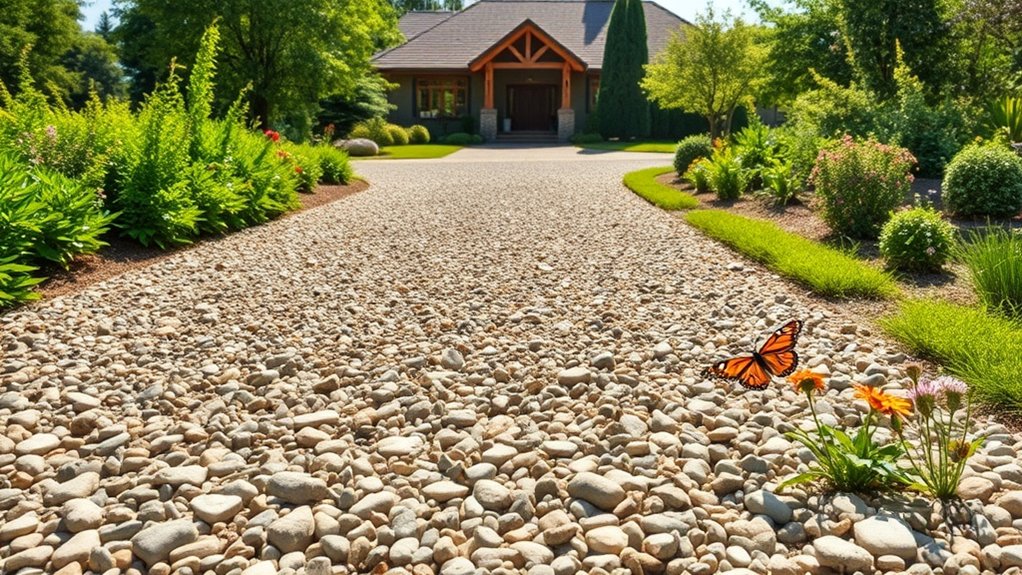
Resin-bound gravel driveways boost your property’s kerb appeal whilst delivering excellent longevity, cutting down on waste. These driveways typically last 15-25 years, far longer than traditional loose gravel options.
| Aspect | Benefits |
|---|---|
| Durability Assessment | Top-grade materials withstand daily wear |
| Maintenance Strategies | Resealing needed every 3-5 years |
| Waste Reduction | Less frequent replacement means less waste |
| Environmental Impact | Fewer repairs save resources |
Simple upkeep, such as regular brushing and cleaning, keeps the surface in top form. Timely repairs can also enhance the lifespan of your driveway significantly. With proper installation and basic maintenance, you’ll have a durable, eco-friendly driveway that serves you well for decades. Additionally, successful installation relies on quality materials, ensuring that the driveway is built to withstand varying weather conditions and daily wear.
Low Carbon Footprint Installation
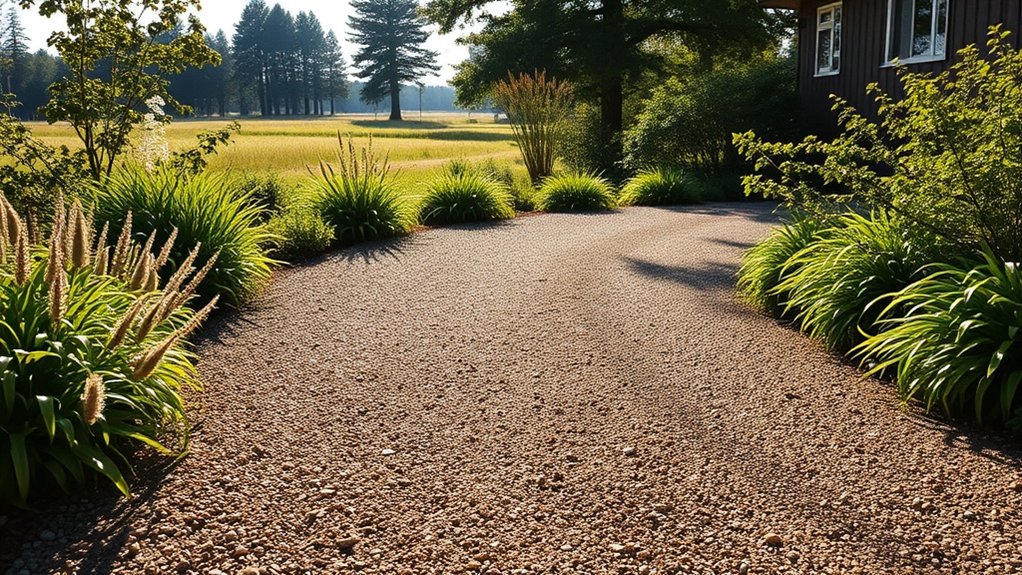
A resin-bound gravel driveway offers both kerb appeal and genuine environmental benefits.
The installation process is notably efficient, using less energy than traditional methods through its cold-mixing approach rather than heat-intensive alternatives. The EcoBatcher mobile mixing unit cuts down vehicle journeys, whilst locally-sourced materials reduce transport miles and support British suppliers.
The system needs fewer raw materials than conventional drives and sets quickly, meaning less disruption and a smaller carbon footprint throughout its lifespan.
It’s a practical way to make your property more eco-friendly without sacrificing looks or durability.
The straightforward installation means:
- Reduced labour hours and energy use
- Fewer delivery lorries on the road
- Support for local quarries and suppliers
- Minimal waste and environmental impact
For UK homeowners seeking sustainable driveway options, resin-bound gravel stands out as a sensible choice that delivers on both environmental and aesthetic fronts.
Environmental Impact on Local Ecosystems
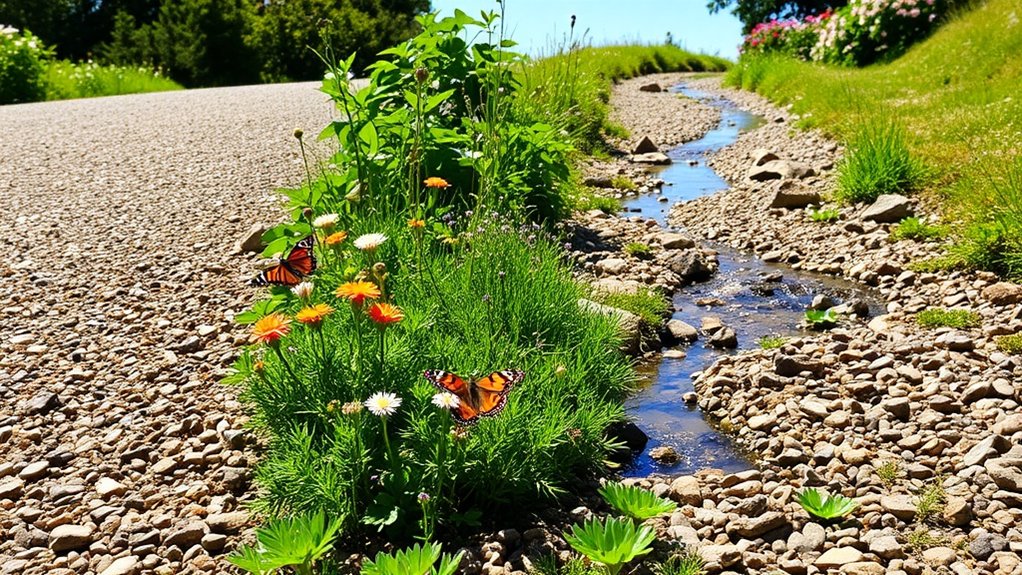
Environmental Effects of Your Driveway Choice
A resin-bound gravel driveway isn’t just practical – it’s better for your local environment. Unlike concrete or tarmac, these driveways let rainwater soak through naturally, much like your garden soil would.
This simple feature brings several local benefits:
- Prevents flooding by reducing water runoff, protecting nearby gardens and homes
- Creates better conditions for local plants and garden wildlife
- Stops harmful pollutants from washing into local streams and rivers
- Keeps surrounding areas cooler in summer, helping insects and plants thrive
- Lasts longer than traditional surfaces, meaning less frequent replacement
Think of it as creating a mini-ecosystem right on your doorstep – one that works with nature rather than against it.
Maintenance and Safety Benefits Favoring Environmental Health
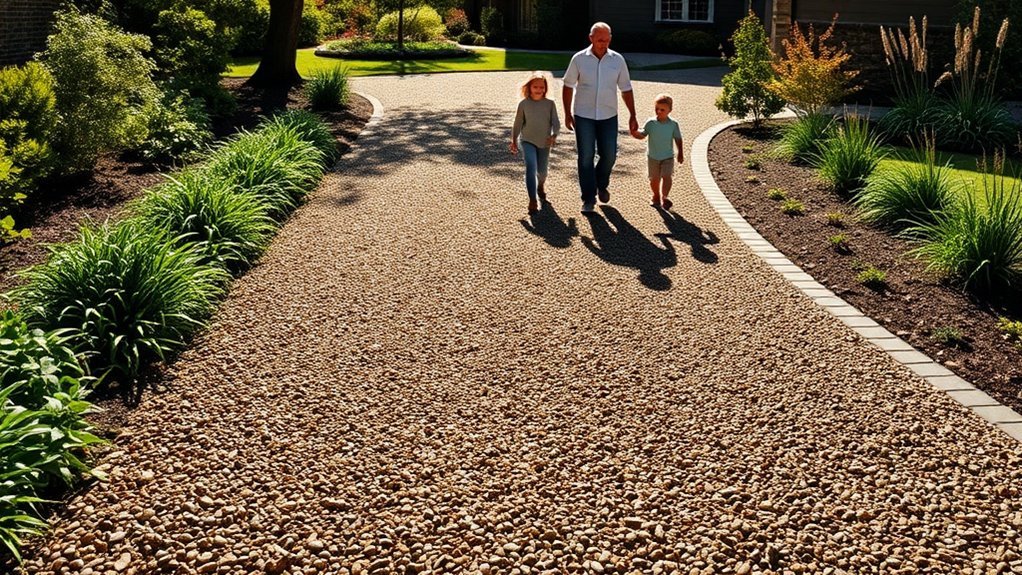
Resin-bound gravel driveways offer practical benefits for both maintenance and safety whilst supporting environmental health.
The smooth surface prevents weed growth and eliminates the need for chemical weedkillers, making upkeep more environmentally sound. Its grip-friendly texture reduces slip risks in typical British weather, particularly helpful for children and elderly residents.
Unlike loose gravel, there’s no stone scatter to damage cars or create trip hazards. The permeable surface handles heavy rainfall effectively, preventing water pooling and supporting natural drainage – particularly valuable for British gardens and local wildlife.
A sensible choice for homeowners wanting a safe, low-maintenance drive that’s kind to the environment.
Aesthetic Appeal and Landscape Integration
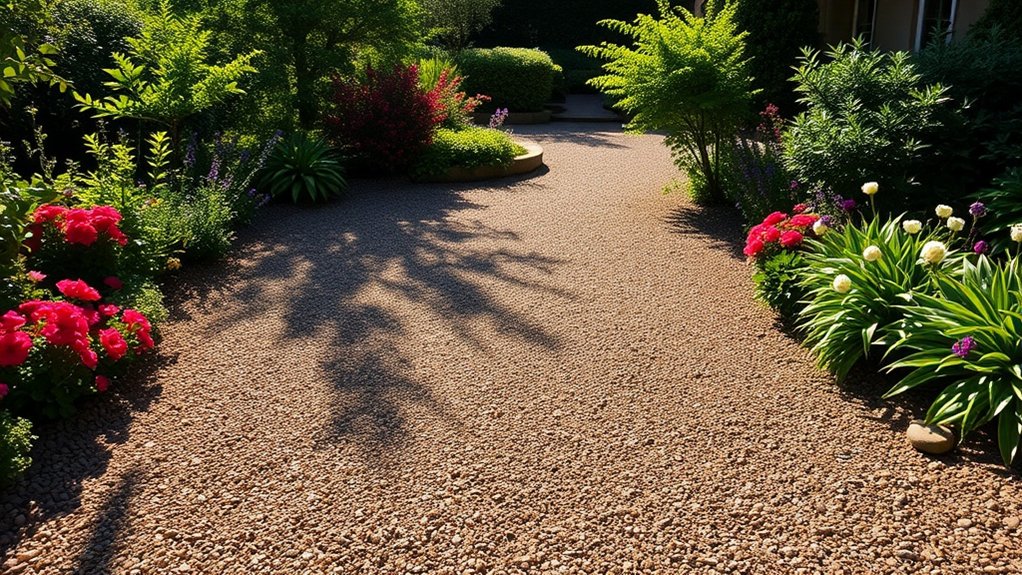
Resin-bound gravel driveways offer more than just durability – they bring genuine aesthetic value to your property.
Choose from a broad range of colours and finishes to match your home’s style, from warm honey tones that suit period cottages to sleek greys perfect for modern builds.
The natural stone finish blends seamlessly with British gardens and landscapes, whilst maintaining a smart, contemporary look.
This versatile surface helps create a polished appearance that lifts your property’s kerb appeal and market worth.
Harmonious Color Combinations
Harmonious Colour Combinations for Resin-Bound Driveways
A resin-bound gravel driveway can transform your property’s kerb appeal with well-matched colours that blend naturally with your garden and house.
Smart colour choices enhance your home’s character whilst creating a welcoming entrance:
Natural tones
Speckled browns and warm creams suit traditional British homes
Light colours
Clean whites and soft beiges create a modern, fresh look
Rich darks
Deep blacks and jewel-toned specs offer dramatic impact
Contrasting blends
Cream and brown mixed with grey provides visual interest
Custom mixes
Bespoke colour combinations to match your property’s style
The right colour choice ties your driveway seamlessly into your overall outdoor design, much like choosing the perfect front door colour to complement your brickwork.
Versatile Design Options
Resin-bound gravel driveways offer far more than simple colour choices.
Their design flexibility lets you create striking patterns like herringbone or checkerboard that suit your home’s style perfectly. The range includes classic British tones – from slate grey to warm cream – making it easy to match your property’s exterior.
Adding a contrasting border gives your driveway a professional finish and ties in nicely with garden paths.
Whether you fancy a traditional look or something more modern, these customisable designs turn a basic driveway into an impressive feature that works brilliantly with your garden whilst remaining practical.
Cost-Effectiveness Over Time
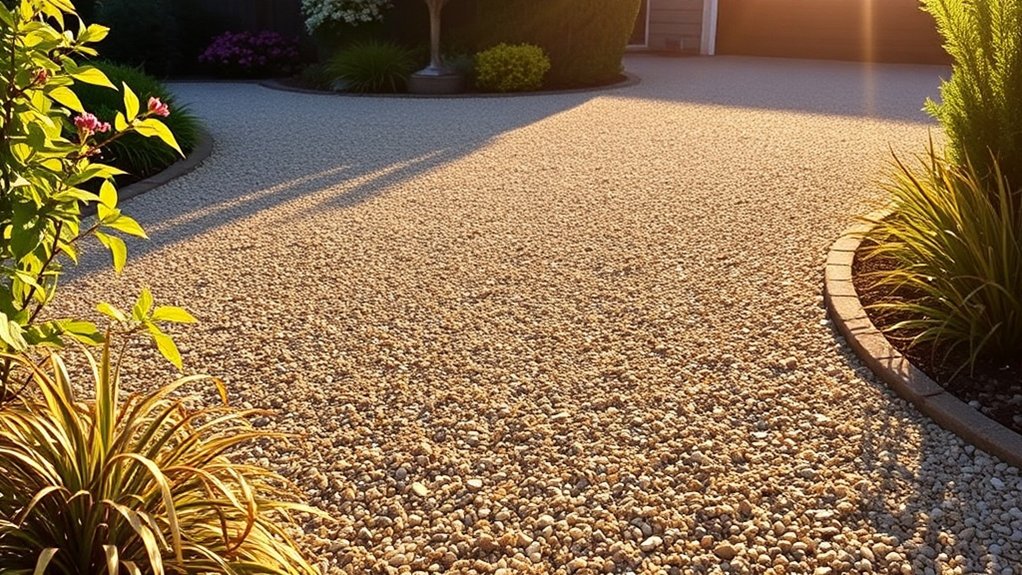
Whilst resin-bound driveways cost more upfront than traditional surfaces, they prove excellent value over time. A typical UK homeowner can expect substantial savings through reduced maintenance and impressive longevity.
Key financial benefits:
- Minimal yearly upkeep costs versus loose gravel driveways
- UV-stable materials prevent costly sun damage repairs
- Strong, durable surface means fewer replacements needed
- Built-in drainage prevents water damage and flooding issues
- Boosts property value through kerb appeal and customisation
The higher initial outlay ultimately proves worthwhile, making resin-bound driveways a practical investment for British homeowners seeking both style and sensible spending.
Supporting Sustainable Urban Development
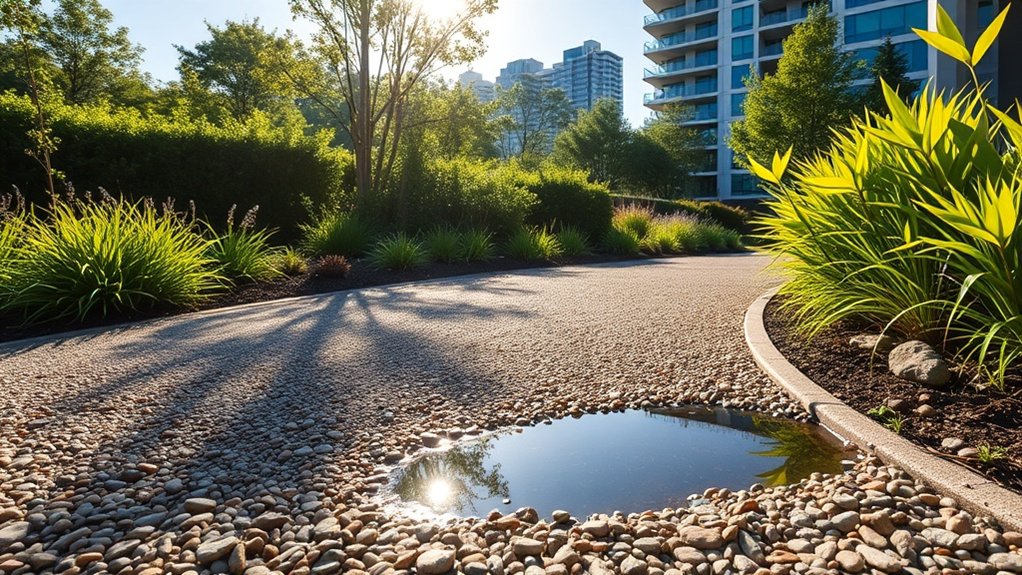
A resin-bound gravel driveway offers more than kerb appeal – it’s a practical choice for sustainable urban living.
The permeable surface tackles common British drainage issues, reducing local flood risks whilst naturally replenishing groundwater.
Made from environmentally conscious materials, it’s a sensible investment that benefits both your property and the wider community.
Permeability and Flood Prevention
A resin-bound gravel driveway offers both kerb appeal and practical flood prevention for your property. The surface allows up to 95% of rainwater to soak through, making it a brilliant choice for sustainable drainage and flood protection.
Key benefits include:
- Prevents surface water pooling during heavy British weather
- Takes pressure off local drainage networks
- Naturally tops up groundwater levels
- Stops soil washing away into nearby streams
- Reduces puddles that attract mosquitoes
When properly laid, a resin-bound surface not only safeguards your property but also supports sustainable urban drainage across your neighbourhood.
As British rainfall patterns become more extreme, this permeable solution proves increasingly valuable for homeowners.
Eco-Friendly Material Use
Resin-bound gravel driveways offer excellent flood protection whilst being environmentally sound – a brilliant choice for sustainable home improvements.
The system uses natural stone and gravel, cutting back on artificial materials and helping conserve resources. You can opt for recycled aggregates too, which reduces landfill waste and the need for new quarrying.
The minimal polyurethane resin needed and locally-sourced stones mean fewer lorry journeys and lower carbon emissions.
These driveways last decades longer than traditional surfaces, meaning fewer replacements and less waste over time. Their tough nature also means minimal upkeep and repairs.
Frequently Asked Questions
Can Resin-Bound Driveways Withstand Heavy Vehicle Traffic?
Resin-bound driveways can handle heavy vehicles when properly installed, but they do need careful planning. Think of daily use like family cars and occasional delivery vans – these are typically fine. However, frequent lorry traffic or heavy machinery might cause issues over time. The key is proper installation with the right sub-base depth and resin mixture. A professionally laid resin drive with an appropriate stone base can last years, even with regular vehicle use, but it’s worth checking weight limits with your installer to ensure it suits your needs.
How Do I Choose the Right Color for My Driveway?
Consider both the practical and visual impact when selecting your driveway colour. Light shades like beige or grey make your space appear larger and more welcoming, whilst darker tones such as charcoal or deep brown lend a more upmarket feel. For the best results, choose a colour that complements your house’s exterior – for instance, pair a red-brick home with warm-toned concrete, or match grey stone with slate-coloured paving.
Are Resin-Bound Surfaces Suitable for All Climates?
Resin-bound surfaces perform well in most UK climates but aren’t without limitations. They cope admirably with our typical wet weather and moderate temperatures, though extreme conditions can pose challenges. In areas prone to severe frost, the surface might need additional treatment, whilst prolonged exposure to intense heat could soften the resin slightly. Think of how a garden path in Brighton differs from one in the Scottish Highlands – both need different considerations. For most British settings, from rainy Manchester to coastal Cornwall, a properly installed resin-bound surface proves reliably durable.
What Is the Typical Installation Time for a Resin-Bound Driveway?
Installing a resin-bound driveway typically takes 3-4 days from start to finish, much like a long weekend project. The timeline includes all prep work, though British weather and your existing surface condition might stretch this a bit longer. Think of it as similar to getting a new kitchen fitted – it’s best to allow a touch more time than you think you’ll need.
Can I Install a Resin-Bound Driveway Myself?
Whilst it’s possible to lay a resin-bound driveway yourself, it’s a complex job that requires significant skill and proper preparation. The task demands precise mixing ratios, swift application before the resin sets, and thorough ground preparation – much like laying a concrete base. DIY installation risks costly mistakes and potential long-term issues with drainage and durability. For most homeowners, hiring professional installers is the safest option to ensure a proper, lasting finish.
Conclusion
Resin-bound gravel driveways offer genuine environmental benefits alongside their aesthetic appeal. Much like double-glazing saves energy in homes, these driveways help manage rainwater through natural drainage, reducing flood risks common in British weather. The materials last significantly longer than traditional tarmac or concrete, meaning fewer replacements and less waste. They’re also made with locally sourced materials, cutting transport emissions. For UK homeowners looking to boost their property’s eco-credentials, a resin-bound surface is a practical investment that works well in our climate whilst supporting environmental sustainability.
